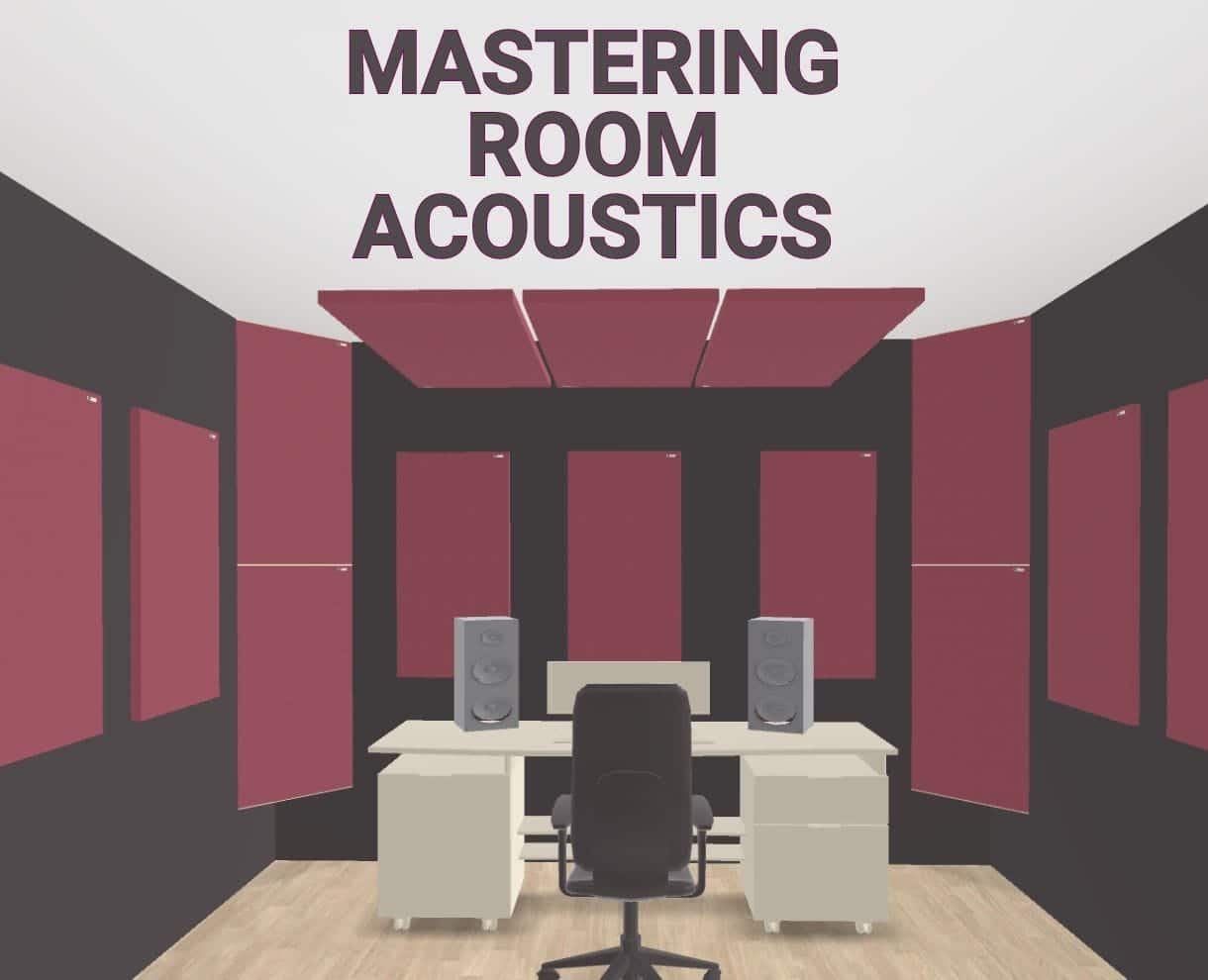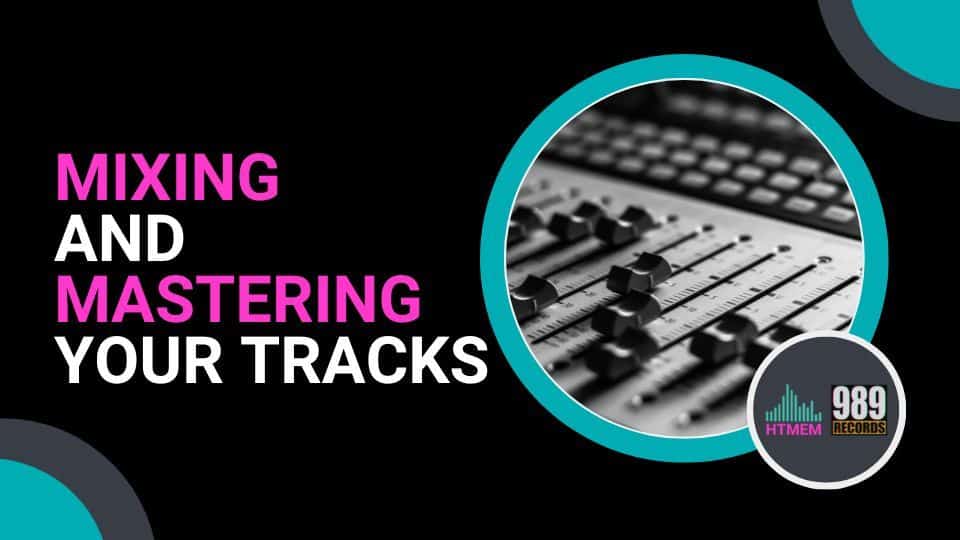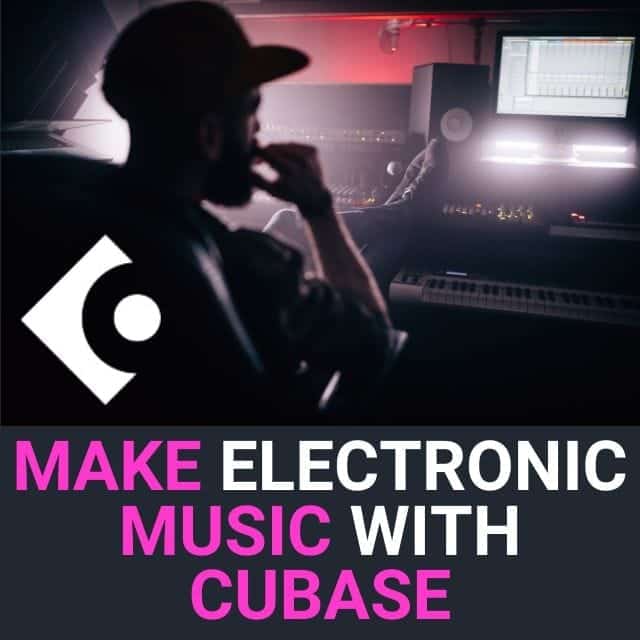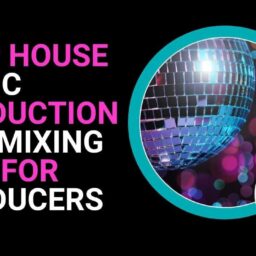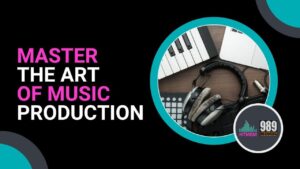
Diving into the world of music production is a journey filled with excitement and potential. Audio engineering plays a crucial role in the music production process, ensuring that the technical aspects of sound are expertly managed. This path can turn your love for sound into a fulfilling profession. With the right combination of knowledge, tools, and commitment, you have the power to create music that touches the hearts of audiences all over the world.
This comprehensive guide will take you through the crucial steps to produce music like a pro, from understanding the fundamentals to promoting and distributing your tracks. Are you set to kick off your musical journey and let your creative juices flow?
Key Takeaways
- Gain knowledge of songwriting, sound design, sound engineering, and arrangement to become a successful music producer.
- Invest in essential gear for recording professional-grade audio
- Master the basics of mixing & mastering.
- Promote your music on online platforms & streaming services while continuously learning industry trends to build a successful career.
What is Music Production?
Music production is the intricate process of creating a recording of a song or piece of music, encompassing various stages that blend both technical and creative skills. At its core, music production involves songwriting and composition, where the initial ideas and melodies are crafted. This is followed by sound design, where unique sounds and textures are created using digital audio tools. The process then moves to mixing, where individual audio clips are balanced and refined, and finally to mastering, where the track is polished for distribution.
In today’s digital age, music production heavily relies on digital audio workstations (DAWs) and a plethora of software plugins. These tools allow music producers to create, record, edit, and mix audio with precision and creativity. Whether working solo or as part of a team, music producers often collaborate with artists, musicians, and other industry professionals to bring a musical vision to life. The fusion of technical prowess and artistic flair in music production is what ultimately shapes the soundscapes that resonate with audiences worldwide.
The Fundamentals of Music Production
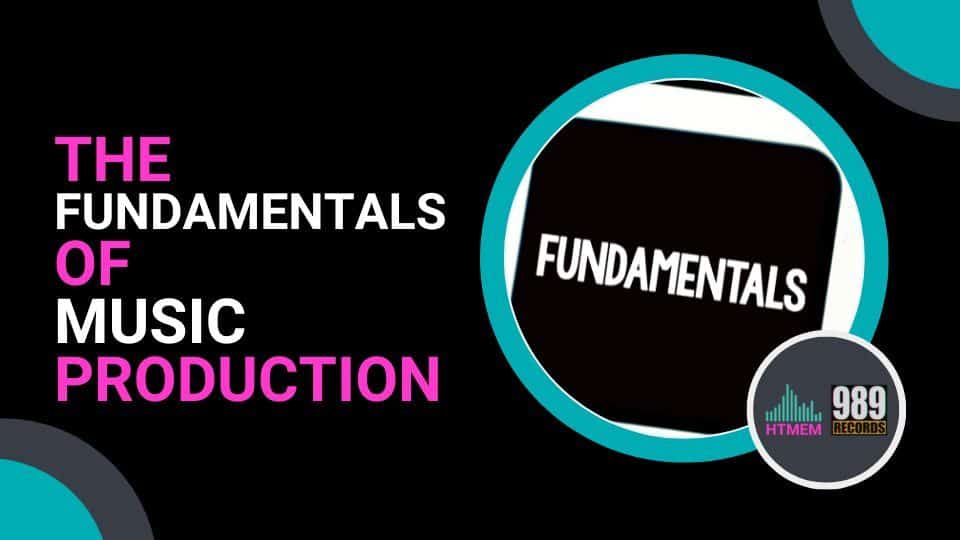
The foundation of music production lies in three essential aspects: songwriting, sound design, and arrangement. A deep understanding of these fundamentals is key to creating a distinct and engaging sound that sets you apart from other music producers. Audio mixing is another fundamental aspect, where individual audio clips are balanced and refined to create a cohesive track. A typical music producer’s role varies from composing beats and songs to engineering recording sessions and providing financial, collaborative, and visionary guidance for artists.
By enhancing your abilities in these areas, you can confidently navigate the complexities of today’s music industry and create engaging tracks that truly connect with your audience.
Songwriting and Composition
Songwriting and composition are at the heart of music production. Music arrangement is also a key component, determining how different sections of the song fit together to create a compelling narrative. A well-crafted song captures the listener’s attention and conveys a powerful message through lyrics and melody. A strong understanding of music theory is vital for creating memorable chord progressions and song structures that resonate with your audience.
As a music producer, it’s your responsibility to create lyrics that are relatable, comprehensible, and enjoyable to sing and convey a significant message. Writing music that achieves these goals is essential for successful music production. Chord progressions play a pivotal role in shaping the mood, tone, and melody of a musical piece. Exploring fundamental chord progressions and melodies is a great starting point for understanding the intricacies of songwriting. With consistent practice and a willingness to experiment with various music genres, you can nurture your distinctive style and produce compelling music that leaves a lasting impression in the industry.
Sound Design and Synthesis
Within the music production sphere, sound design and synthesis revolve around crafting and manipulating sounds to attain a specific sonic texture. Sound manipulation techniques are essential for achieving the desired sonic texture and character in your music. This process encompasses the use of various tools and techniques, such as synthesizers, samplers, and audio effects. Whether you’re producing electronic music or recording live instruments, sound design is an essential aspect of the music production process.
By exploring and experimenting with novel sounds and techniques for audio manipulation, you can establish your unique sonic brand. Utilizing sample packs, synthesizers, and audio effects can help you design captivating soundscapes that complement your compositions. As you progress in your music production career, exploring different sound design tools and techniques will expand your creative palette and enhance your ability to produce innovative and captivating music.
Arrangement and Structure
A well-structured arrangement is critical for effectively conveying your musical ideas and capturing your audience’s attention. Track arrangement involves deciding the order and structure of different elements within a song to maintain listener interest. The arrangement dictates the order in which different elements of a song are presented, such as:
- Introduction
- Verse
- Chorus
- Bridge
Electronic music often features a unique song structure that includes elements like a pause, tension, and drop. Tuning into songs by other professional producers can help you recognize these recurring components in an electronic track. To create captivating arrangements, it’s essential to understand the interplay between different instruments and sounds within your composition. This involves carefully selecting and positioning elements within the mix, as well as experimenting with various song structures to find the most engaging and impactful presentation. Once you’ve honed your skills in arrangement and structure, you’ll be more than ready to produce music that not only captivates your audience but also leaves a lasting impact on them.
Choosing Your Digital Audio Workstation (DAW)
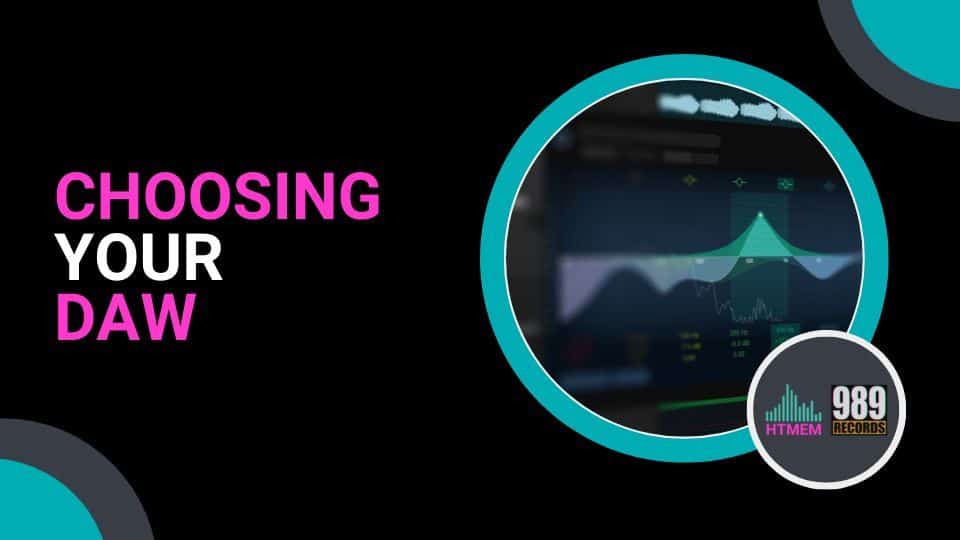
Choosing the appropriate Digital Audio Workstation (DAW) is a significant step in your music production journey. Audio editing capabilities are crucial in a DAW, allowing you to fine-tune your recordings with precision. A DAW is a software used to record, edit, and produce music, acting as the central hub for all your creative endeavors. Factors such as features, price, and system requirements should be considered when choosing the most suitable DAW for your needs.
With appropriate music production software, you’ll gain access to a robust set of tools that simplify your workflow and empower you to produce top-notch music.
Features to Consider
When choosing a DAW, it’s important to take into account the features that correspond with your music production goals and preferred workflow. Workflow refers to the sequence of steps and organization that culminates in the final music production. Different DAWs offer varying workflows, so it’s crucial to choose one that complements your creative process, promoting productivity and efficiency.
Audio processing features, such as EQ and compression, are essential for shaping the sound of your tracks.
Plugin compatibility is another important factor, as it ensures that you can access a wide range of audio effects, virtual instruments, and processing tools within your chosen DAW. Additionally, built-in instruments and effects can save time and money by eliminating the need for external plugins or instruments. By carefully evaluating these factors, you can select a DAW that provides the optimal balance of features and compatibility for your music production needs. Looking for more details about DAWs? Refer to this post here to read about Superb Make Music Software for EDM Producers.
Price and System Requirements
The cost and system requirements of a DAW can significantly impact your budget and computer performance. Professional Digital Audio Workstations typically range in price from $100 to $900 or higher. While more expensive DAWs often offer advanced features and capabilities, there are also cost-effective options available that provide basic features for novice users or those with a limited budget.
In terms of system requirements, a general recommendation includes:
- Quad-Core Processor (i5 or i7)
- At Least 4GB of RAM
- 64-bit Operating System
- Minimum of 500GB of Internal Storage (HDD or better SSD)
Ensuring that your computer meets the minimum requirements for your chosen DAW will prevent performance issues and guarantee a smooth, efficient music production experience.
Essential Gear for Music Production
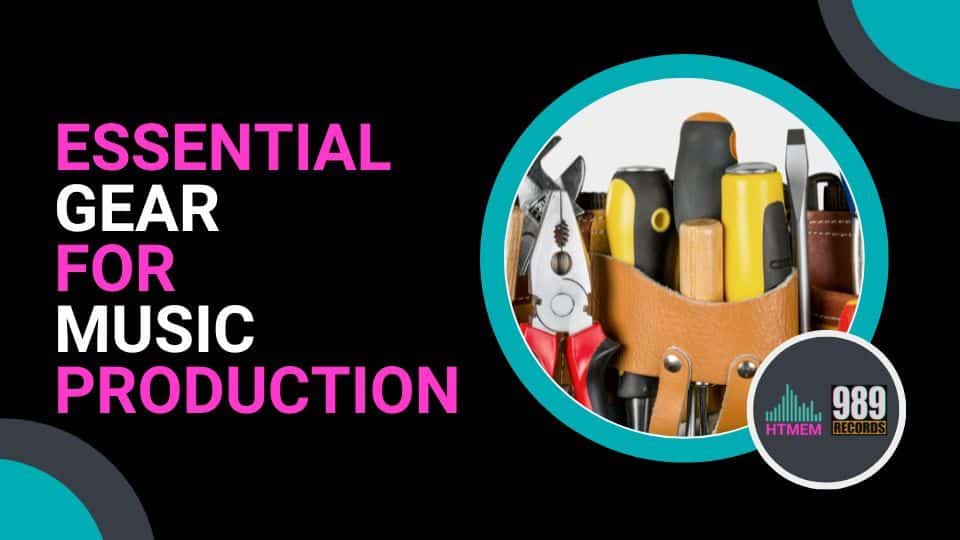
Beyond choosing the right DAW, procuring essential gear for music production is vital for yielding professional-grade results. Setting up a well-equipped recording studio is crucial for achieving professional-grade results. Some essential gear for music production includes:
- MIDI Controllers
- Studio Monitors
- Headphones
- Microphones
- Audio Interfaces
These components are all vital for a well-equipped music production setup, especially for those looking to create their own music.
Investing in top-notch gear equips you with the necessary tools to create, record, and produce music that distinguishes itself in the competitive music industry.
MIDI Controllers
MIDI controllers enable tactile manipulation of virtual instruments and DAW functions, such as keyboards and drum pads, offering hands-on control and creative freedom. MIDI controllers are indispensable tools for music creation, allowing you to interact with virtual instruments in a tactile way. Some examples of MIDI controllers include:
- MIDI Keyboards: USB keyboards that connect to your computer and allow you to generate musical notes
- MIDI Drum Pads: pads that simulate the feel and response of real drum pads, allowing you to play drum sounds and create beats
- MIDI Control Surfaces: devices with sliders, knobs, and buttons that can be assigned to control various parameters in your software
MIDI controllers provide a hardware-based workflow that grants versatility and adaptability comparable to software plug-ins.
Several MIDI controllers, like the Akai MPK Mini and the Arturia Minilab, offer cost-effective solutions for those looking to incorporate hands-on control into their music production setup. Playing around with various MIDI controllers and exploring their unique capabilities can lead you to the perfect tool that not only enhances your creativity but also makes your workflow more efficient.
Studio Monitors and Headphones
Studio monitors and headphones play a crucial role in music production by providing accurate audio reproduction for critical listening during the production process. High-quality studio monitors and headphones allow you to make informed decisions about your mix, ensuring that your music translates well across various playback systems.
Accurate audio monitoring is essential for making informed decisions during the production process.
When selecting studio monitors or headphones, consider factors such as:
- Frequency Response
- Power and Volume
- Size and Shape
- Built-in Flexibility
- Accuracy and Neutrality
Brands like Yamaha, KRK, Adam Audio, Genelec, and JBL offer highly recommended studio monitors for music production, while Audio Technica provides reliable entry-level headphones.
Interested in Boosting Your Mixing Abilities? Take a Look at Our Mixing Course and Learn How to Mix Electronic Dance Music with Free Plugins.
Microphones and Audio Interfaces
Capturing high-quality recordings of vocals and instruments is essential for producing professional-sounding music. Microphones and audio interfaces are indispensable tools for achieving superior audio quality during the recording process. Sound recording quality is significantly enhanced by using the right microphones and audio interfaces. Microphones such as the Shure SM7B (dynamic) and AKG C414 (condenser), are renowned for their exceptional sound capture capabilities.
Audio interfaces, on the other hand, are devices that feature inputs for instruments or microphones and outputs for various speaker configurations. An audio interface is a valuable investment, as it can significantly improve the quality of your recorded sound. By selecting the right microphones and audio interfaces for your setup, you’ll be well-equipped to capture pristine recordings that enhance your music production.
Mastering the Recording Process
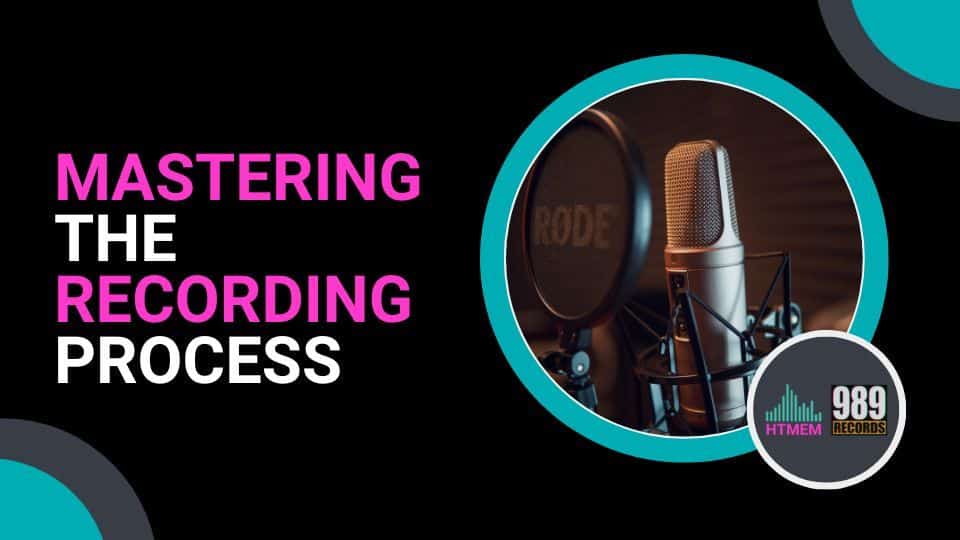
Mastering the recording process is fundamental to producing music that sounds professional. Mastering the recording process is a fundamental aspect of successful audio production. This involves setting up a home studio, learning various recording techniques, and understanding the intricacies of mixing and mastering.
Refining your skills in these areas positions you well to create captivating, polished tracks that exhibit your distinct sound and production capabilities.
Setting Up a Home Studio
Establishing a home studio requires careful consideration of room acoustics, equipment placement, and budget constraints. Selecting the right room for your studio is essential, as room acoustics can significantly impact the quality of your recordings. A well-planned studio setup is essential for optimizing your recording environment. Factors such as low noise level, rectangular shape, size, and location should be taken into account when choosing a suitable space for your home studio.
In addition to room selection, equipment placement plays a vital role in optimizing your studio’s performance. Positioning your gear strategically, such as the placement of studio monitors and microphones, can greatly enhance the quality of your recordings. By setting up a well-designed home studio, you’ll create an environment that fosters creativity, productivity, and professional-quality sound.
Recording Techniques
Mastering various recording techniques is crucial for capturing high-quality audio. Proper microphone placement, for example, can significantly improve the clarity and presence of vocals and instruments in your recordings. Proper audio capture techniques are crucial for achieving high-quality recordings. Additionally, gain staging is an essential technique for managing volume levels at each stage of amplification, ensuring a clean and balanced mix.
Understanding the unique characteristics of different instruments and their optimal recording methods is also vital in achieving professional-quality sound.
The Music Producer’s Role
A music producer is the linchpin of the music production process, overseeing every aspect from the initial spark of an idea to the final mastered track. The role of a music producer is multifaceted, blending creative direction with technical expertise and project management. At the heart of their responsibilities is guiding the artist, helping to shape the sound and direction of the music while ensuring that the artist’s vision is realized.
Music producers are instrumental in selecting the right equipment and software, often working with digital audio workstations (DAWs) to craft and refine the music. They make critical creative decisions, such as arranging the composition, choosing the right sounds, and applying effects to enhance the track. Beyond the studio, music producers may also navigate the business side of the music industry, negotiating contracts, managing budgets, and coordinating with other professionals involved in the project.
To excel in this role, music producers need a deep understanding of music theory, composition, and production techniques. Strong communication and project management skills are equally important, as they must effectively collaborate with artists and other team members. Ultimately, a successful music producer is one who can seamlessly blend creativity with technical skill, bringing out the best in the music and the artist.
Mixing and Mastering Your Tracks
Once you’ve captured your recorded music, the next step is to mix and master your tracks. Mixing involves balancing levels, applying effects, and refining the overall sound of your music.
Audio mastering is the final step, where your tracks are optimized for distribution.
On the other hand, mastering is the final stage of production, where your tracks are optimized for distribution.
Mixing Tips and Tricks
One of the most critical aspects of mixing is the use of EQ.
Audio effects like reverb and delay are essential tools for creating depth and space in your mix.
EQ allows you to manipulate the frequency content of your mix, achieving balance and clarity by adjusting the volume level of specific frequencies, cutting unwanted frequencies, and boosting those that sound good. Compression and Reverb are other essential tools for creating a balanced and polished sound in your mix.
By mastering the use of EQ, compression, and reverb in your mixing process, you can create a mix that is well-balanced and exudes a professional sound quality.
Mastering Basics
Mastering is the final stage of music production, where your tracks are optimized for distribution. This involves adjusting levels, applying limiting, and ensuring consistency across multiple tracks.
Ensuring high audio quality is the primary goal of the mastering process.
Mastering enhances the overall sound quality of your music, preparing it for playback on various systems and platforms.
To master your tracks effectively, it’s essential to understand the nuances of optimizing levels and applying limiting. Additionally, using reference tracks can help you achieve consistency across multiple tracks and ensure a cohesive sound throughout your entire project.
Promoting and Distributing Your Music
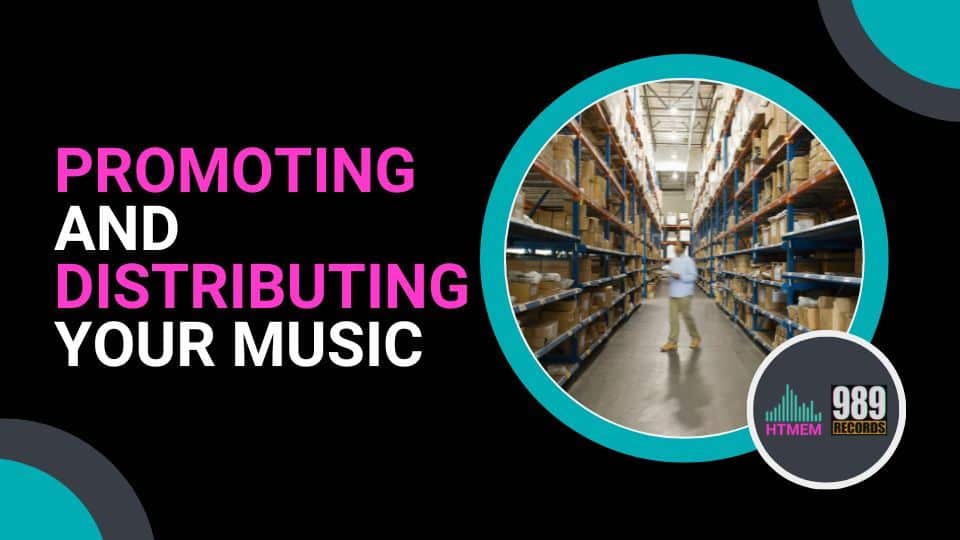
Once your music has been produced, mixed, and mastered, it’s time to present it to the world.
Effective music distribution is key to reaching a broader audience and monetizing your work. The promotion and distribution of your music are key to reaching a broader audience and monetizing your creative work. By leveraging online platforms, streaming services, and networking opportunities, you can effectively showcase your music to listeners and industry professionals, ultimately expanding your reach and growing your career in the music industry.
Online Platforms and Streaming Services
Online platforms and streaming services, such as Spotify and SoundCloud, are indispensable for reaching a wider audience and generating income from your music. Digital distribution platforms like Spotify and SoundCloud are essential for reaching a global audience. By distributing your music on these platforms, you can gain exposure to millions of listeners worldwide and tap into potential revenue streams through streaming royalties and merchandise sales.
To make the most of these platforms, it’s essential to create a strong online presence and engage with your audience. Here are some tips to help you:
- Share your Music on Social Media.
- Collaborate with Other Artists.
- Participate in Online Communities to Build your Fan Base and Increase your Visibility.
With dedication, passion, and persistence, you can start producing music and turn your passion for music production into a great career (good luck with it🤞).
Networking and Collaboration
It’s essential for your success as a music producer to establish industry connections and encourage creative expansion through networking and collaboration. Collaborations offer the opportunity to combine your talents, perspectives, and ideas with other artists, leading to unique and innovative music that resonates with audiences.
Music collaboration can lead to unique and innovative projects that resonate with audiences.
Join Us for Free
Networking with other music producers, artists, and industry professionals can open doors to new opportunities, such as joint performances, shared fan bases, and access to different markets. Attend music conferences, workshops, and local events to connect with like-minded individuals and expand your network. Through the power of collaboration and networking, you can not only improve your music production abilities but also establish meaningful connections that can significantly boost your career trajectory.
Continual Learning and Skill Development
As the world of music production is in constant flux, keeping abreast of industry trends and techniques is fundamental to sustaining a successful career. Continual learning and skill development allow you to adapt to new technologies, refine your production skills, and create innovative music that captivates your audience.
Investing in music education is essential for staying current in the ever-evolving music industry. Investing in your personal growth and knowledge positions you well to navigate the ever-evolving landscape of music production, keeping you ahead of the curve.
Online Tutorials and Courses
Online tutorials and courses offer accessible and affordable ways to learn new techniques and stay up-to-date with industry trends.
Online learning platforms offer accessible and affordable ways to enhance your music production skills.
By investing in online tutorials and courses, you can expand your skillset, enhance your understanding of music production, and discover new creative approaches. Continual learning is essential for staying relevant in the competitive music industry, and these resources provide an invaluable opportunity to grow and refine your skills at your own pace.
Books and Magazines
Books and magazines provide in-depth knowledge and insights from industry professionals, helping you expand your understanding of music production. Industry publications like MusicTech and Sound On Sound provide valuable insights and trends in music production. Renowned magazines, such as MusicTech and Sound On Sound, offer valuable information on the latest trends, techniques, and tools in the industry. Additionally, books written by music industry professionals on various aspects of music production can provide a wealth of knowledge, allowing you to dive deeper into specific topics and refine your skills.
Why I Wrote This
As a Steinberg Certified Trainer with over 30 years in the music production industry, I’ve seen countless technological revolutions and guided thousands of producers through their musical journeys. I wrote this guide because I believe quality music production education should be available to everyone who loves making music. This music production guide is designed to provide you with the knowledge and tools needed to succeed in the industry. Throughout my career at major studios and as an instructor, I’ve developed proven methods that turn beginners into confident producers. Check out my pages on Instagram, Beatport, and the 989 Records Official Site.
Note: This article contains links to my Udemy Courses. As an industry expert, I only endorse products I have personally created and developed—the commissions I earn fund my research and testing.
My Production Story
I started producing music in the early ‘90s, and I struggled with many of the same issues you might be facing today. My music production journey began in the early ‘90s, and I’ve faced many of the same challenges you might encounter today. I vividly remember spending hours troubleshooting technical issues that could have been solved in minutes with proper guidance. But at that time, the Internet was only at the beginning, and accessing studios to learn something was difficult. Anyway, these experiences shaped my teaching philosophy: providing clear, actionable advice that helps you avoid common pitfalls and speed up your learning curve. Every technique I share in this guide has been tested in my professional work with Grammy-nominated artists and major label productions.
How I Teach Music Production
I can tell you that my teaching methodology is focused on practical application rather than theory alone. While understanding the “why” behind production techniques is important, I believe in learning by doing. That’s why, throughout this guide, I’ve included specific exercises and real-world examples from my studio sessions. Whether you’re making electronic beats or recording live instruments, my goal is to give you skills you can apply to your own projects.
Beyond The Technical: Nurturing Your Creative Voice
In my three decades as a producer and educator, I’ve seen that technical proficiency alone doesn’t create good music. That’s why I emphasize developing your unique sonic identity alongside technical skills. Developing your unique sonic identity is an integral part of the creative process in music production. The approaches I share for sound design and arrangement aren’t just industry standards – they’re starting points for your creativity. I’ve helped thousands of students find their sound while maintaining professional quality, and I’m sure these methods will work for you, too.
Staying Current In A Fast Changing Industry
The music production landscape has changed dramatically throughout my career. From tape machines to cloud collaboration, I’ve adapted to each technological shift while keeping the timeless production principles. Keeping up with industry trends is essential for adapting to new technologies and techniques. As someone who works with the latest Steinberg technologies and mentors next-generation producers, I continually refine my approaches based on industry developments. This guide combines the fundamentals with the latest techniques from today’s production world.
Committed To Your Success
Unlike many online resources that just scratch the surface, I’ve written this guide to cover the entire production process. My goal is to help you achieve music production success by providing comprehensive guidance and support. If you have questions beyond what’s here, I’m active on my Udemy platform, where I provide personalized feedback to my students. Music production is both an art and a science, and I’m committed to helping you with both.
These paragraphs add to your existing content by addressing the review’s feedback:
- Proving your expertise and experience
- Adding personal anecdotes from real life
- Focusing on the reader
- Being original and in-depth
- Building trust through personal connection
- Delivering what the reader expects
Summary
In conclusion, mastering the art of music production is an exciting and rewarding journey. By following this guide, you can develop the music production skills needed to create captivating music. By understanding the fundamentals, selecting the right tools and equipment, mastering the recording process, and continually learning and developing your skills, you can create captivating music that resonates with listeners worldwide. As you start your music production adventure, remember that persistence, creativity, and a willingness to learn are essential for achieving success in the ever-evolving world of music production. Now go forth and make some incredible music!
Frequently Asked Questions
What Does it Mean to Produce Music?
Music production is the process of developing, creating, and refining music for public presentation. The music creation process involves multiple stages, from initial songwriting to final mastering. This involves songwriting, recording, mixing, and mastering to ensure the finished product reflects an artist’s vision and meets the needs of the label and artist. Music producers bring an artist’s vision to life.
What do I Need to Produce Music?
To produce music, you need a computer, DAW software, an audio interface, a microphone and accessories, and headphones or monitors.
Having the right production tools, such as a DAW and audio interface, is essential for producing music.
Is Music Production a Real Job?
Music production is a real job and is becoming increasingly popular in the music industry today. Producers assist artists with their recording projects, guiding them through the creative process and helping bring their vision to life. The music production profession offers opportunities to work with both established and emerging artists. As a music producer, you would be working with both established and new artists in any genre of music, creating original tracks and helping shape their sound.
What is the Role of a Producer in Music?
A Music Producer is responsible for overseeing and directing recording projects, guiding sessions, suggesting changes to instrumentation, effects, and lyrics, managing budgets, and providing direction and vision for the artist and engineers. They also gather ideas and inspiration for projects.
The production role involves guiding the artist and shaping the overall sound of the music.
How do I Start Producing Music?
Start producing music by training your ears, learning an instrument, practicing writing music, deciding on music equipment, getting comfortable with a DAW, setting up a studio, finding artists to collaborate with, and mastering recording, mixing, and mastering.
Starting your production journey involves learning the basics and gradually building your skills.
Suggested Reading
Explore these music production resources to deepen your understanding and skills.
Practice and Enjoy!




